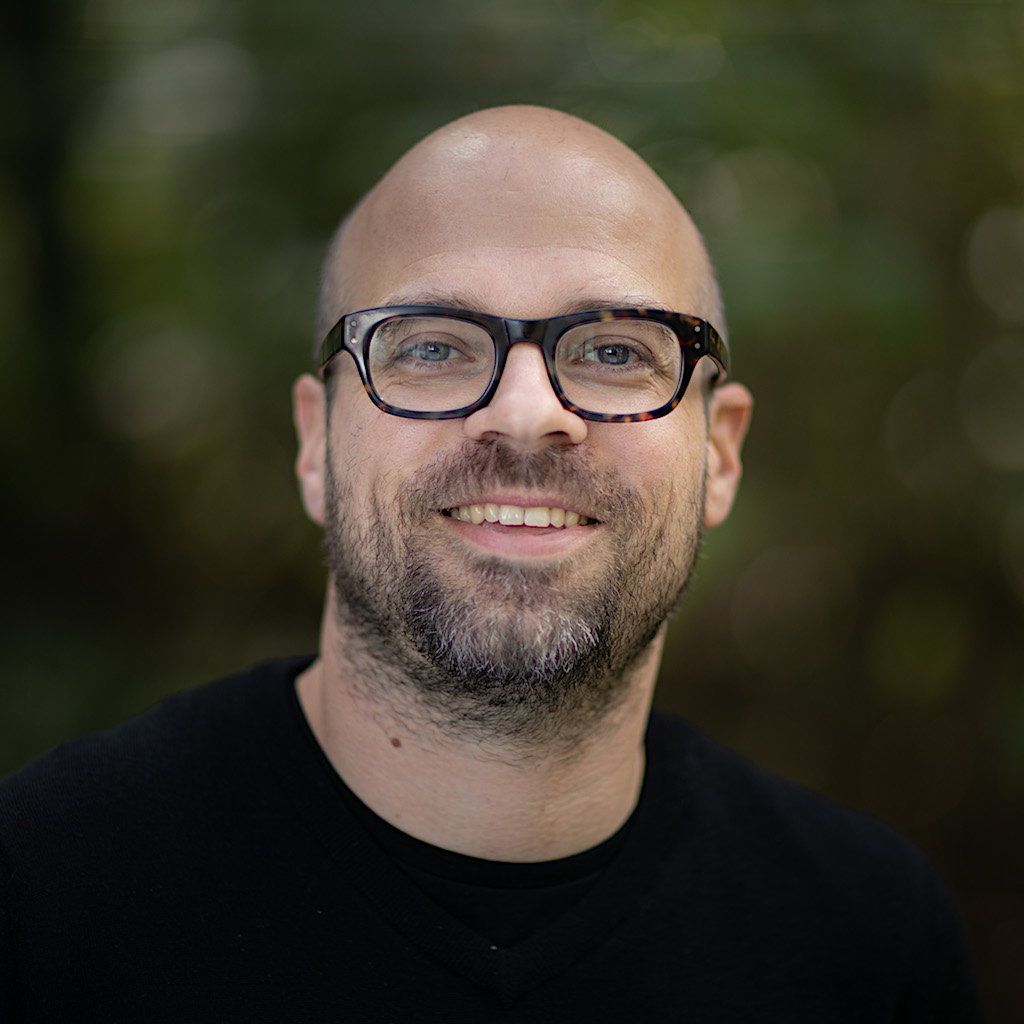
Hallo. I am Martin Dittus.
I am a data scientist and digital geographer with 20 years of experience across the public sector, non-profits, startups, and academia.
As Lead Data Analyst at Camden Council I manage multiple teams of data analysts for Camden's social and education services. Previously I worked at Lewisham Council as a data scientist, as insight lead for the council's cost of living programme, and provided monitoring and evaluation support for Lewisham's food justice action plan.
In my previous life as an academic I was a digital geographer and data scientist at the Oxford Internet Institute, where I researched the information geographies of Wikipedia, Google Maps, and other large online knowledge platforms. Together with my coauthor Mark Graham I wrote the book "Geographies of Digital Exclusion: Data and Inequality" for Pluto Press, and contributed to the State of the Internet's Languages Report by Whose Knowledge, collecting evidence that the global majority is underserved by today's internet platforms. In earlier work I produced analyses of the economic geography of darknet marketplaces.
I completed a PhD in computer science at the ICRI Cities at University College London, where I researched community engagement for the Humanitarian OpenStreetMap Team (HOT), a volunteer initiative with thousands of contributors. I have published papers in major academic venues, and two of them have received awards. It was very much a collaborative effort, and we couldn’t have done it without a lot of community support!
I have previously been a software developer and project manager at Last.fm, a trustee for U.K. charity Local Welcome, a director and trustee of the London Hackspace, an organiser for Hack the Barbican and the Electromagnetic Field camping festival, a cat herder for Air Quality Egg contributors, and more.
My data visualisations have been featured in the Times Comprehensive Atlas of the World (16th ed.) [1], Infosthetics [2][3], Visual Complexity [4][5], FlowingData [6], in print magazine De:Bug [7], Manuel Lima’s Visual Complexity book [8], the German-language Visual Simplexity book [9], and elsewhere.
Past work
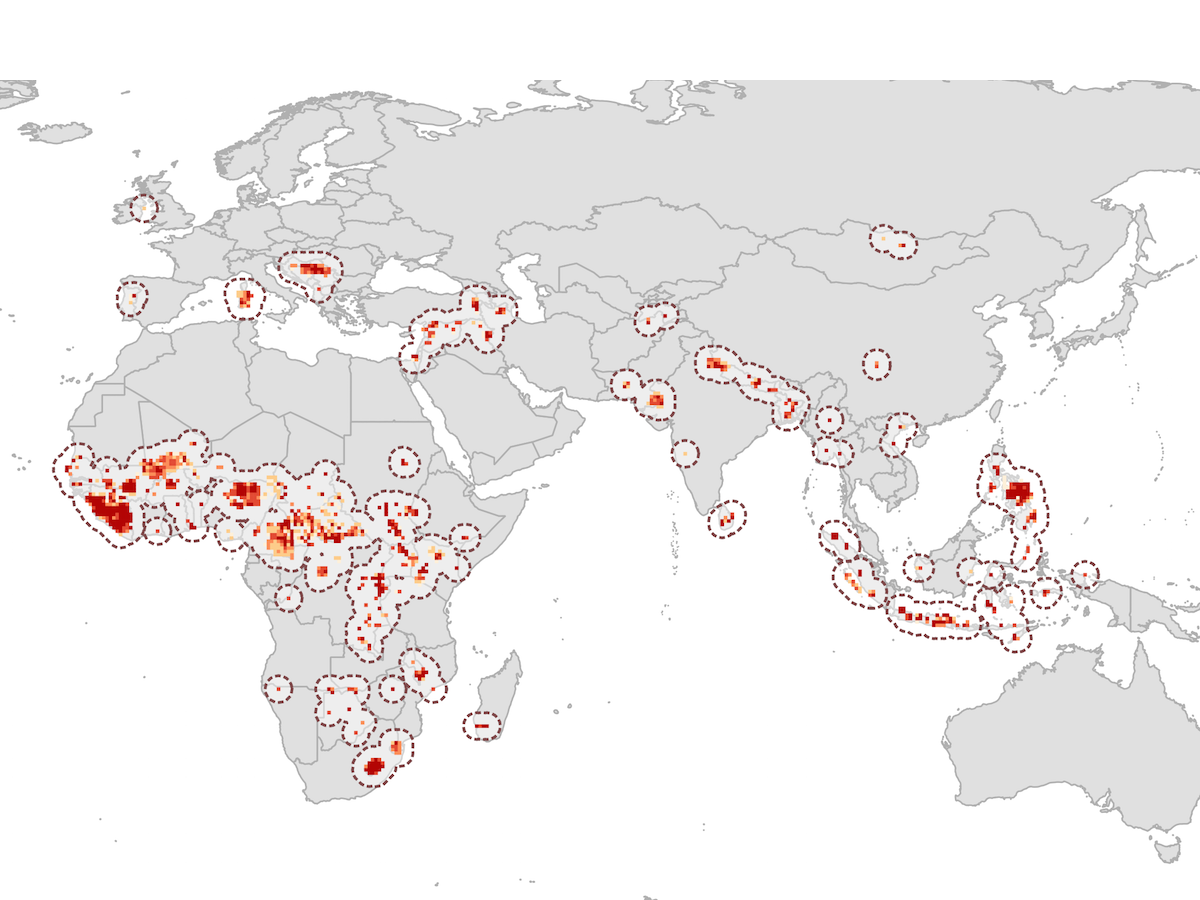 Research diary: contributor engagement in humanitarian mapping
Research diary: contributor engagement in humanitarian mapping
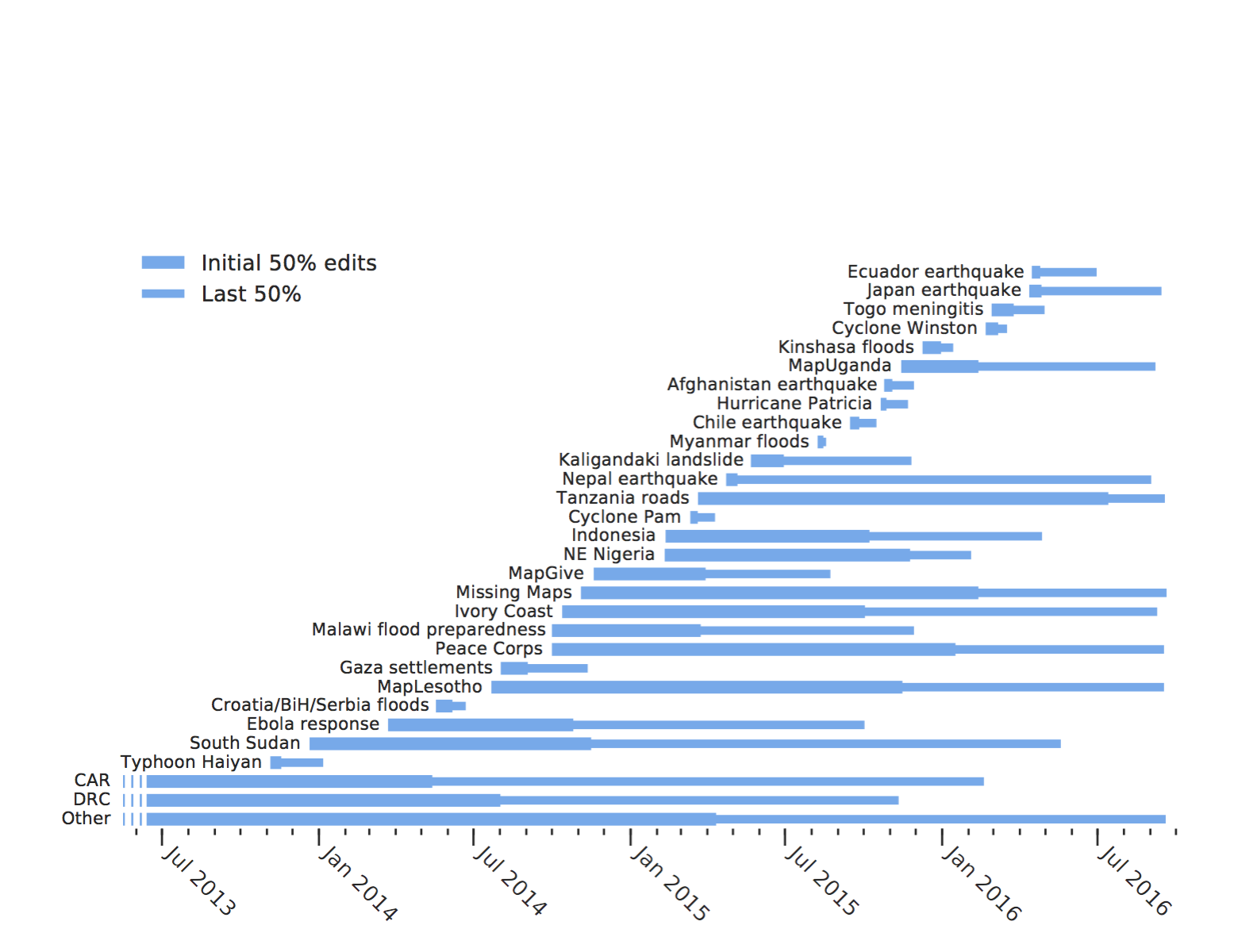 State of the Map 2016: Building large-scale crowdsourcing communities with the Humanitarian OpenStreetMap Team
State of the Map 2016: Building large-scale crowdsourcing communities with the Humanitarian OpenStreetMap Team
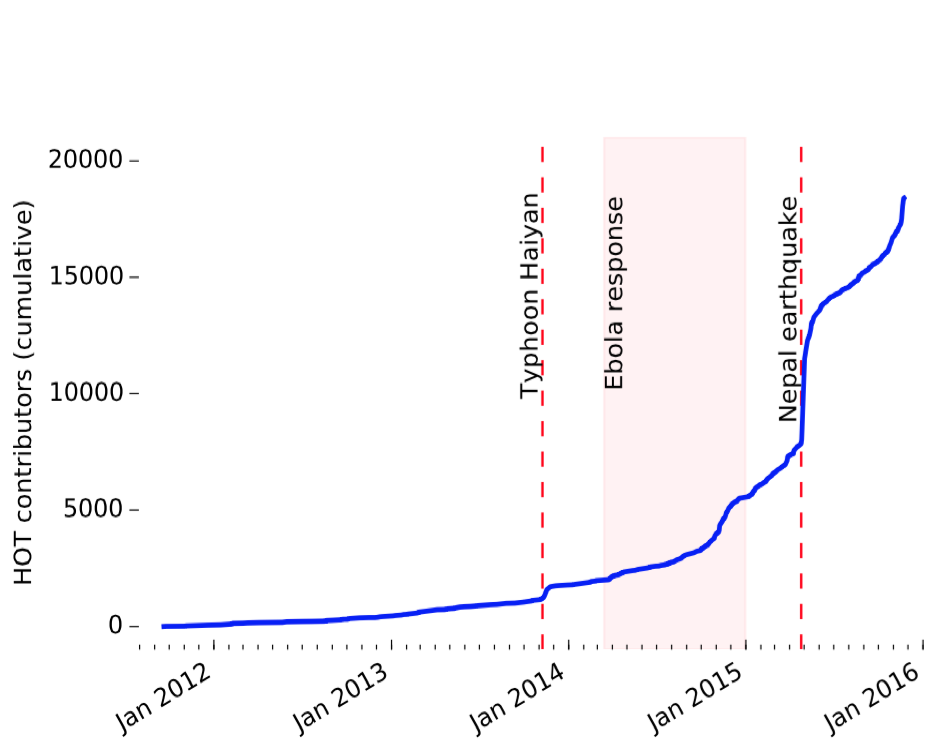 OII Talk: Big Data and Putting the World's Vulnerable People on the Map
OII Talk: Big Data and Putting the World's Vulnerable People on the Map
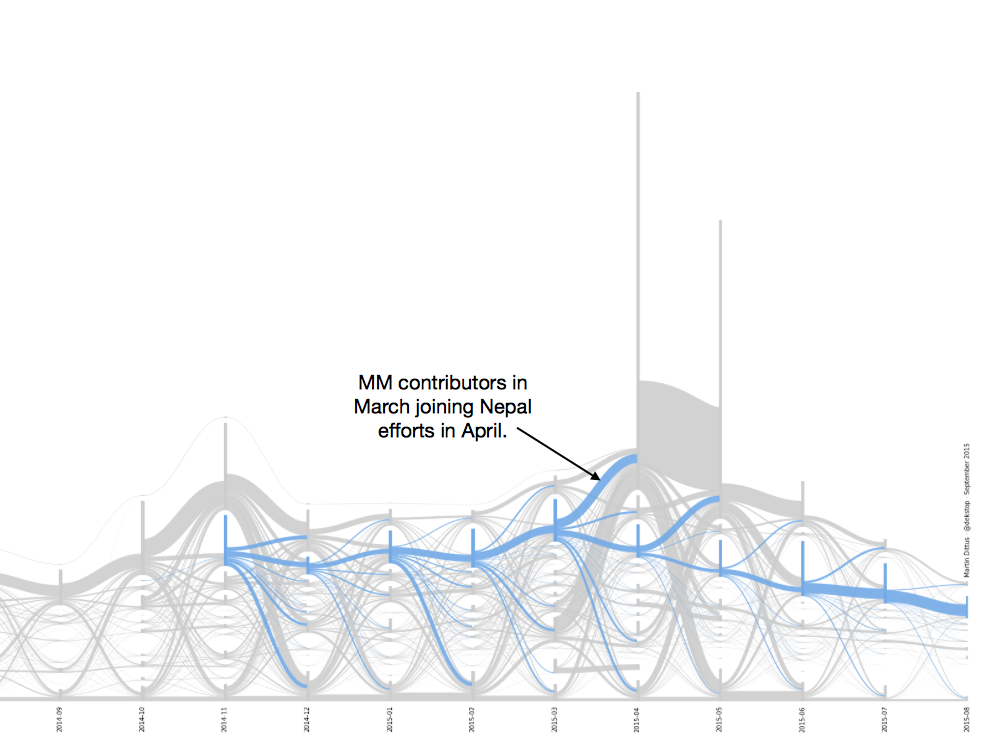 Missing Maps: the first year in stats & charts
Missing Maps: the first year in stats & charts
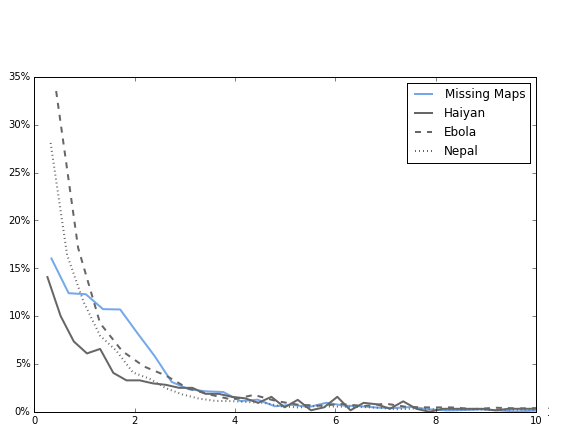 Participation inequality in humanitarian mapping
Participation inequality in humanitarian mapping
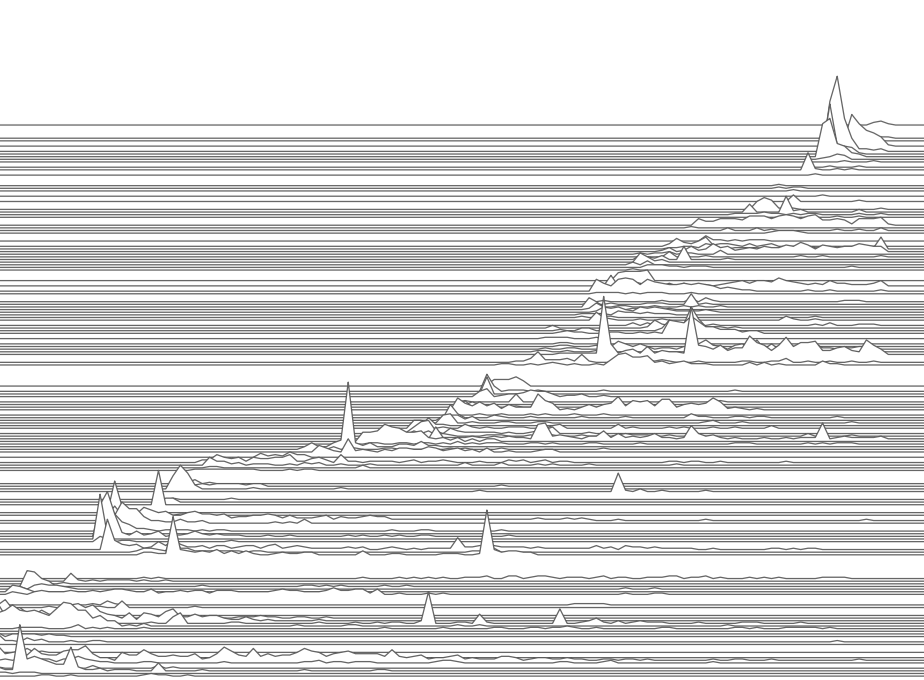 Unknown Pleasures (of humanitarian mapping)
Unknown Pleasures (of humanitarian mapping)
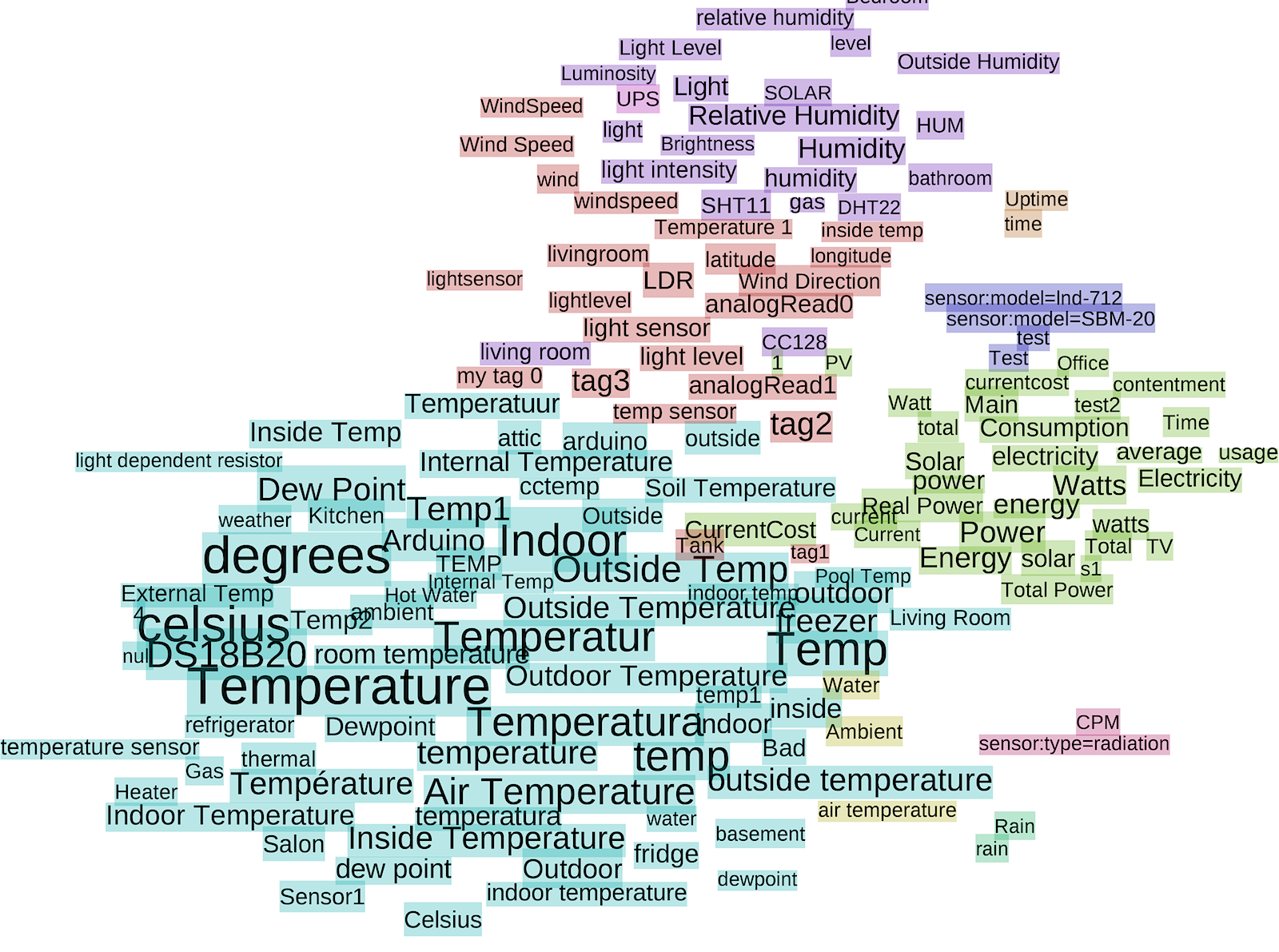 Collective Sensor Networks
Collective Sensor Networks
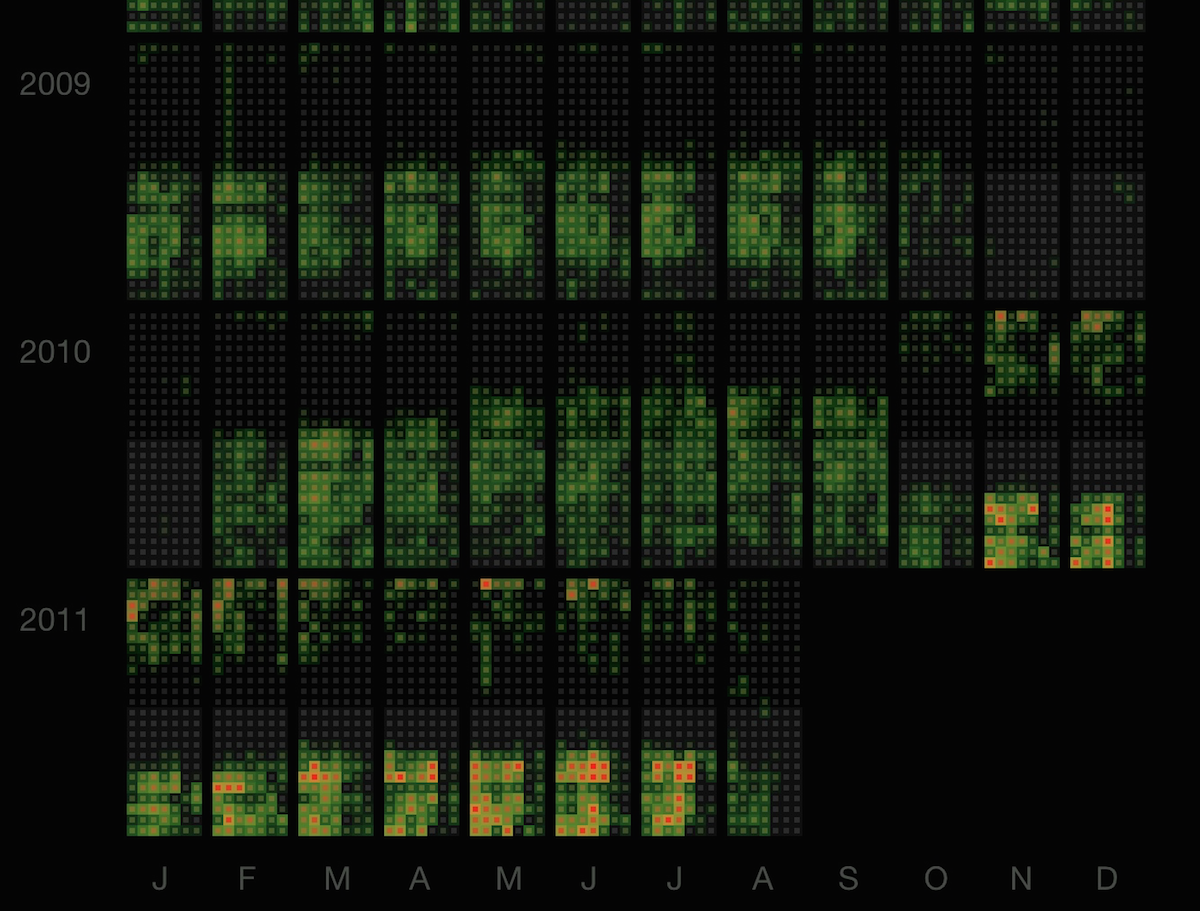 Last.fm Heatmap Calendars
Last.fm Heatmap Calendars
Selection of talks
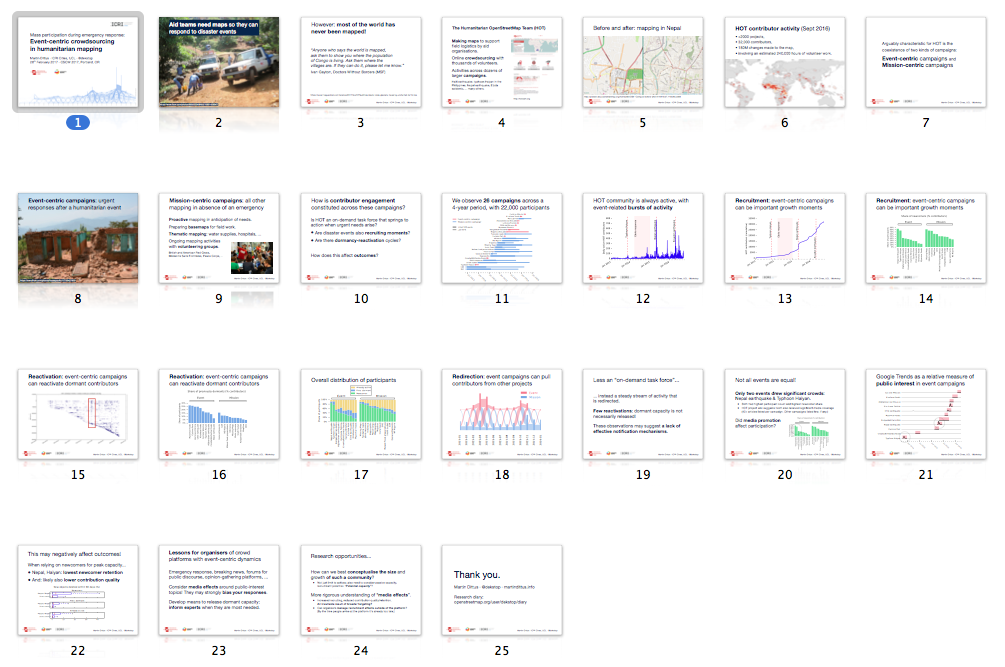 Mass participation during emergency response:
Event-centric crowdsourcing in humanitarian mapping
Mass participation during emergency response:
Event-centric crowdsourcing in humanitarian mapping
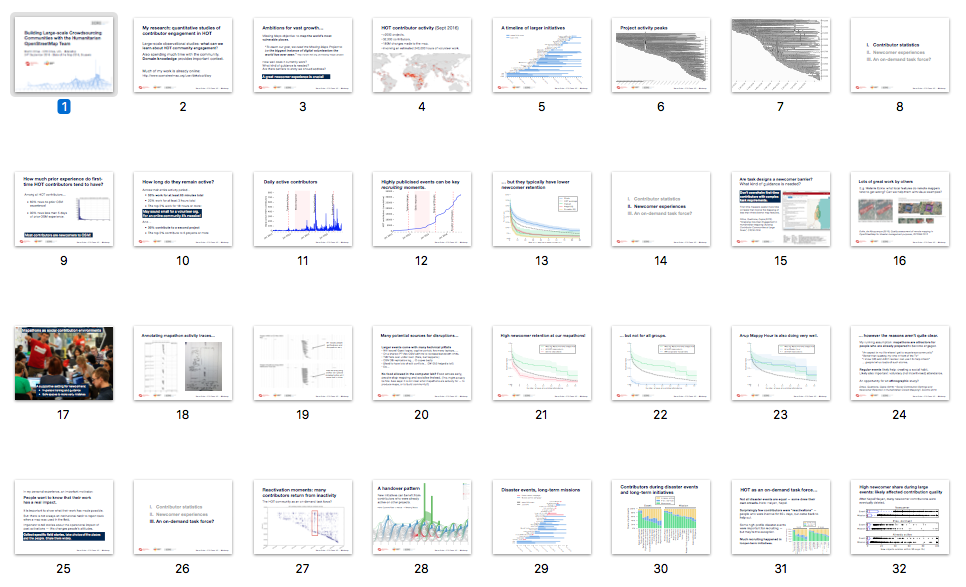 Building Large-scale Crowdsourcing Communities with the Humanitarian OpenStreetMap Team
Building Large-scale Crowdsourcing Communities with the Humanitarian OpenStreetMap Team
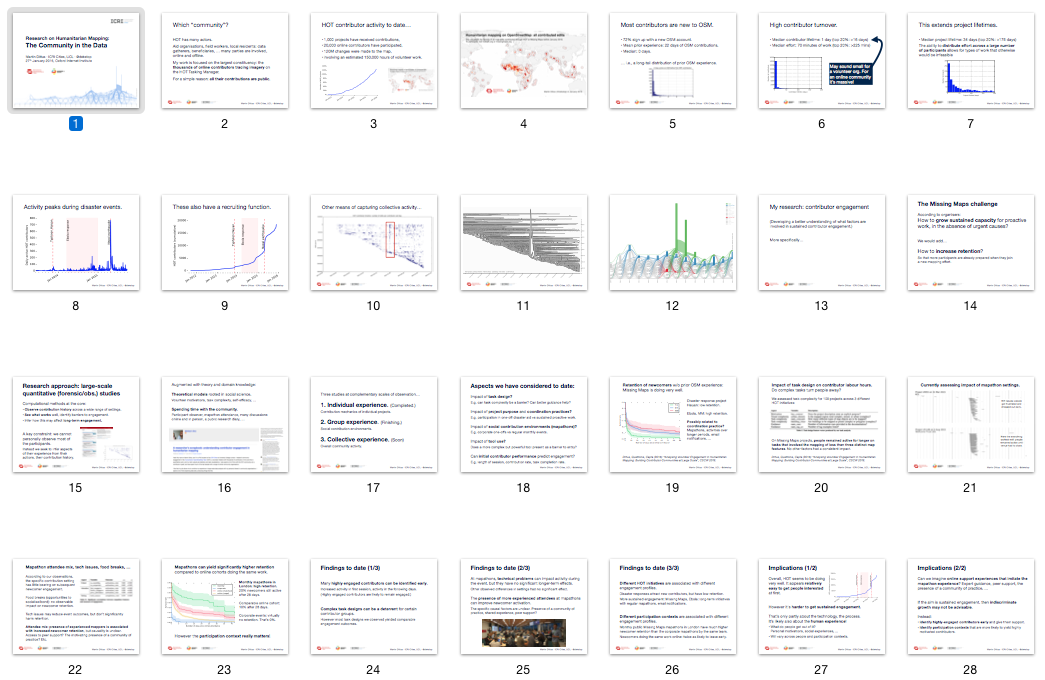 Big Data and Putting the World's Vulnerable People on the Map
Big Data and Putting the World's Vulnerable People on the Map
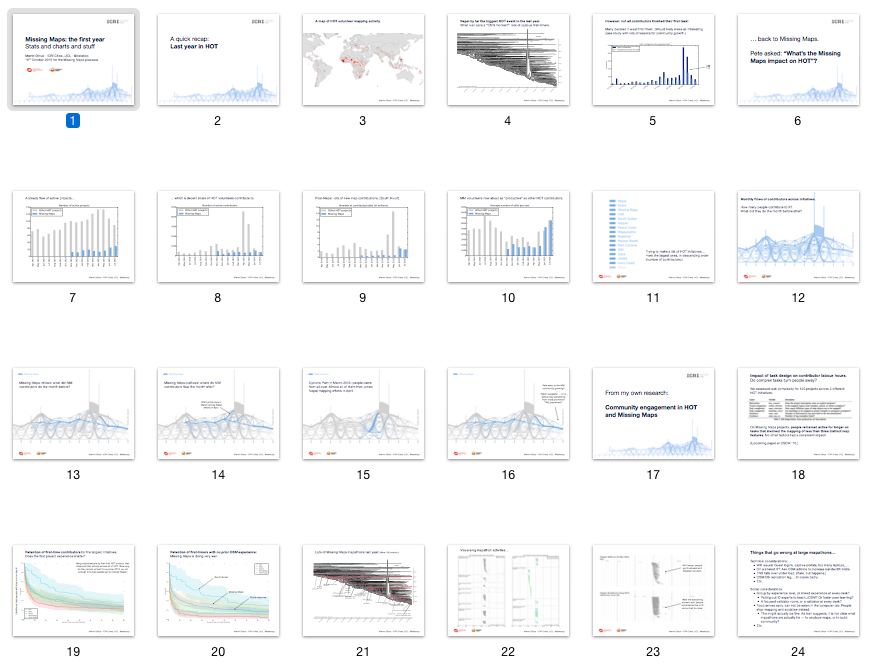 Missing Maps: the first year in stats & charts
Missing Maps: the first year in stats & charts
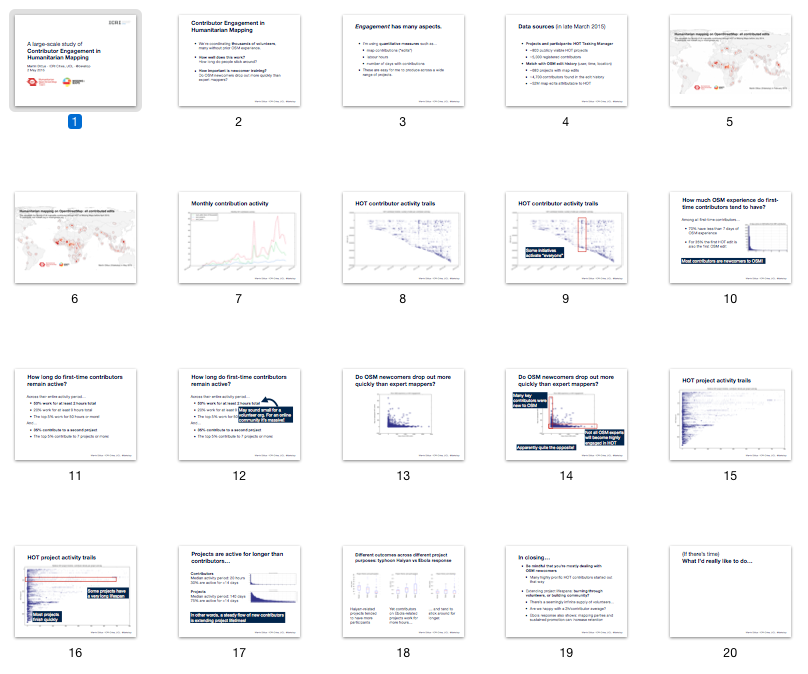 Contributor engagement in humanitarian mapping
Contributor engagement in humanitarian mapping
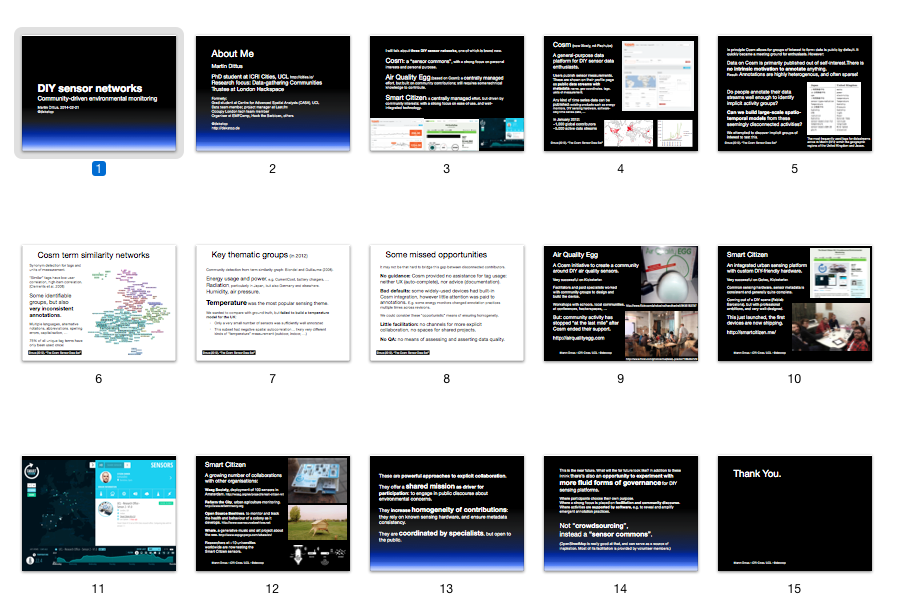 DIY sensor networks: community-driven environmental monitoring
DIY sensor networks: community-driven environmental monitoring
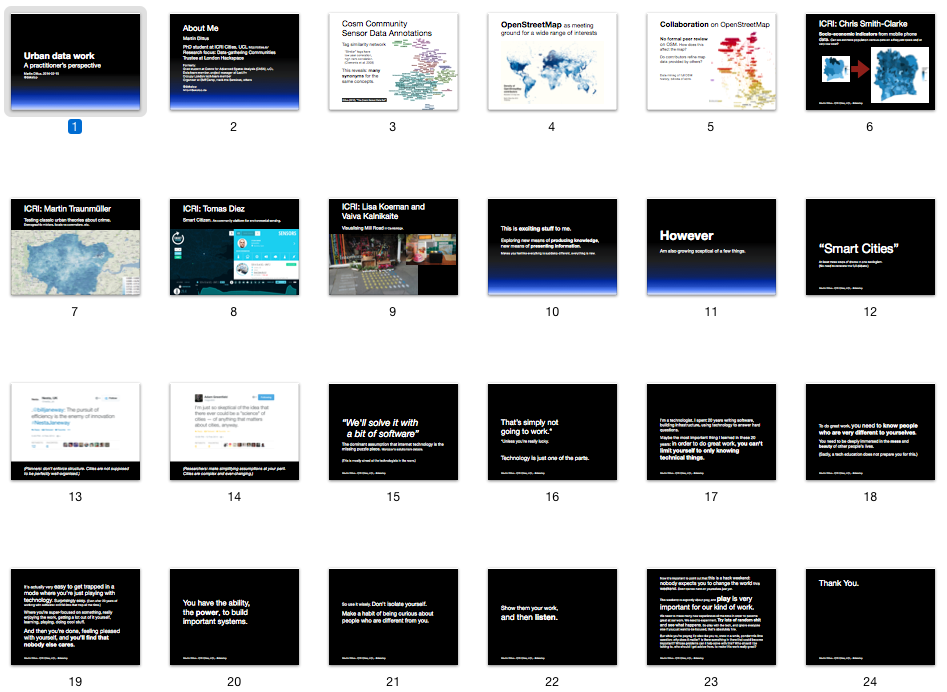 Urban data work: a practitioner’s perspective
Urban data work: a practitioner’s perspective
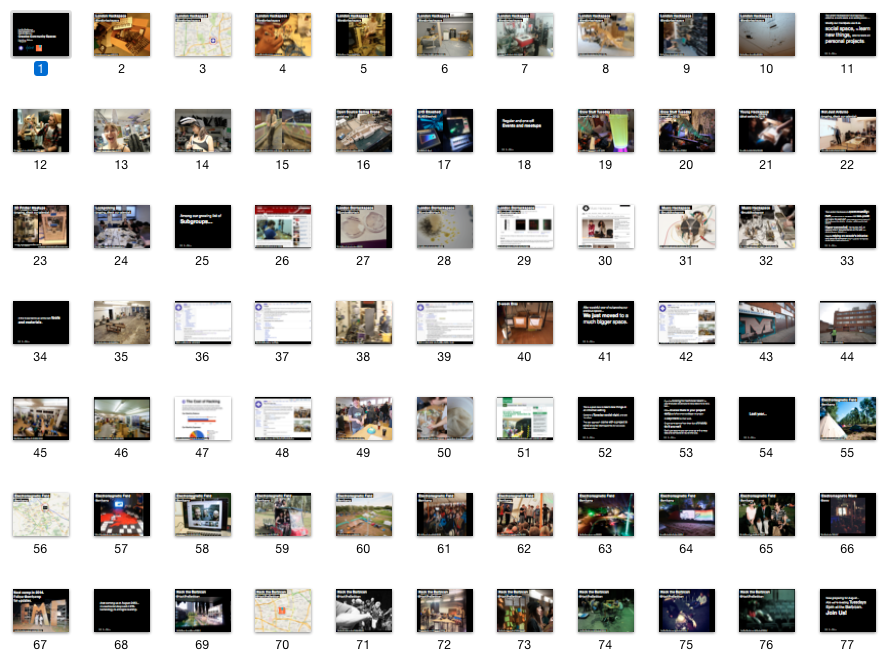 Creative community spaces: London Hackspace, Electromagnetic Field, and Hack the Barbican
Creative community spaces: London Hackspace, Electromagnetic Field, and Hack the Barbican
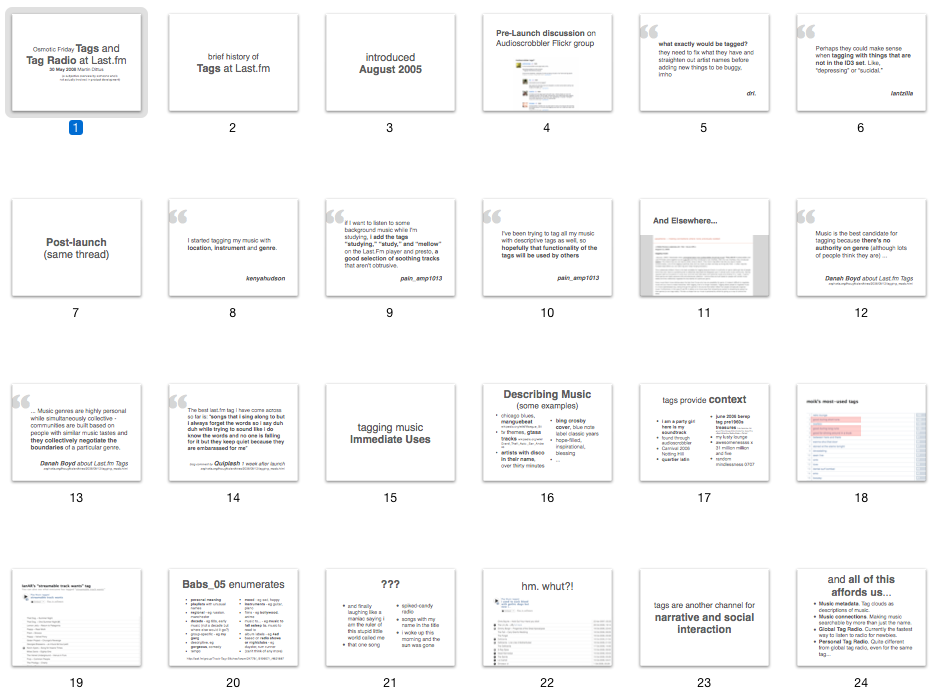 Tags and tag radio at Last.fm
Tags and tag radio at Last.fm
Other activities
-
Open data sets collected by "everyone"
A talk at Innovation Week Rome on the topic of community knowledge: data and information collected by community groups. During this event 300 people, 30 facilitators, and 10 international speakers were co-creating ideas for a social innovation city. Slides
-
A practitioner’s perspective on urban data work
A talk at Urban Data Hack about my data visualisation and data analysis work in the context of urban spaces, including work by colleagues at the ICRI Cities. Closes with comments on technology-based solutions to social problems, and some suggestions on how best to start looking for important problems. Slides.
-
Open hardware projects at the London Hackspace
A talk for Design Culture Salon at the Victoria & Albert Museum in London, the world's leading museum of art and design. Part of a panel on transparent design with Jessi Baker, Alison Powell, Gillian Youngs, and Kevin Walker. What are the ethics and politics of transparency, and is this is being adequately factored into design practice? Slides.
-
OpenStreetMap community diversity
An article for State of the Map, the annual gathering of the global OpenStreetMap community. Maps have a peculiar ability to act as a stage for shared concerns, as catalysts and connectors for a wide range of interests.
-
The politics of making
A panel discussion at the Elephant & Castle Mini Maker Faire with Cory Doctorow, Sarah Corbet, Eva Verhoeven, and Nelly Trakidou. Can maker culture be understood as political act, as resistance against late capitalism? Slides, video.
-
Creative community spaces
A talk at Bartlett Plexus about the London Hackspace, the Electromagnetic Field camping festival, and Hack the Barbican as community-created spaces. Slides, video.
-
A sensor commons: DIY environmental monitoring
A talk at the Electromagnetic Field camping festival, reviewing a range of global DIY environmental monitoring activities. The Air Quality Egg, SafeCast, DIY spectrometry, and more. Slides.
-
Last.fm heatmap calendars
Visualising the music listening habits of selected Last.fm users. In total the project involved the aggregation of 8.7 million scrobbles across ~180 graphs. Project page, blog post.
-
Music Feeds
A now defunct music blog aggregator, built at the first ever music hack day in London. You could filter posts with Last.fm user profiles, a fulltext search, and more. The results were great: pop culture snippets, opinionated commentary, podcast feeds, and lots of noise. Blog post.
-
Lots of data, little money. A Last.fm perspective
What to do when the data you have to analyse keeps growing but your budget doesn't? A discussion of how Last.fm became one of the first commercial adopters of Hadoop, and one of the biggest users of commodity distributed systems. Slides, video.
-
Pool Radio
A now defunct aggregator of hopefully interesting Last.fm radio stations, aggregated from user tag feeds, group forums, global tag charts, and more. Blog post.
- … and more.
See also
- GitHub: dekstop
- OpenStreetMap: dekstop
- Google Scholar: Martin Dittus